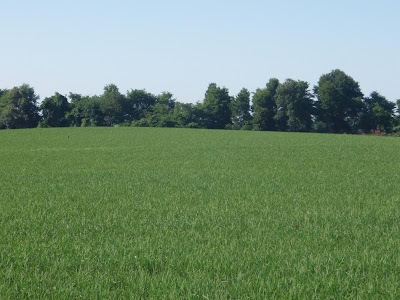
Last week I got to visit SE Missouri and NE Arkansas. Our cooperator near Pocahontas, Arkansas, has some nice-looking rice (photo below), so we will see what this summer brings. We have begun to shift our focus a little in the Circles for Rice program. We really seem to have shown that this system works, so we now work to simply support people who want to try growing rice with pivots, as opposed to creating and promoting demonstration plots.

With the current economic issues at work, there still seems to be pressure for growers to shift acreage to other crops, at least here in the U.S. and in Brazil. In other areas, especially Africa, the situation is a bit different, and we have been working with several growers developing rice projects using pivots as the source of irrigation. These are, generally, relatively large projects, so they take quite a bit of time to get up and running. However, we will bring you news and progress reports as they develop.
A couple nights ago, I watched a television special on the Discovery Channel: Nik Walenda walked across the Grand Canyon on a cable, suspended 1500’ above the river below, with no tether or safety harness. He kind of reminded me of a farmer. He did a tremendous job of preparing, so that it really did look easy. Not easy enough for me to try it, though!
How many of you find yourselves in similar circumstances — balancing a lot of factors both known (crop production costs, machinery issues) and unknown (the vagaries of summer weather like severe storms or drought, crop price fluctuations)? It sometimes seems like the best approach is just what he did — prepare as well as we can, then just keep putting one foot in front of the other, until we get through the current season.
The good news is, we ARE into another summer, firmly seated in the rhythm of the crop growing season. Somehow, I think that helps farmers cope with some of the other peripheral issues that pop up. There is something neat about growing a crop, and it brings us back to earth in a lot of ways. We might not know how the future is going to work out, but we do know how to recognize what is happening in our fields, and what to do about it. That process gives keeps us in our comfort zone; it allows us to focus on what we enjoy doing, and doing well. So, I encourage you to stay safe and have a great growing season. Keep putting one foot in front of the other. Stay in touch, and let us know how things are going in your neck of the woods (or prairies!).
Have a comment or question on the drought in the U.S. or growing rice with center pivots? Drop us a note in the Comments box below!
 |
Kelly Downing Global Irrigation Specialist Kelly, Nebraska-based Irrigation Specialist, spent 10 years working on soil and water research projects for a major agricultural university, involving a variety of crops. His work focused on irrigation management, but also included other topics. |
| Since joining Valley Irrigation, he has worked in the fields of Service, Product Management, Product Reliability and Sales. Kelly focuses on developing projects in irrigation field management and providing recommendations for the Circles for Rice project. Kelly has traveled to several countries providing technical support, such as soil moisture monitoring and irrigation management training. | |


Comments